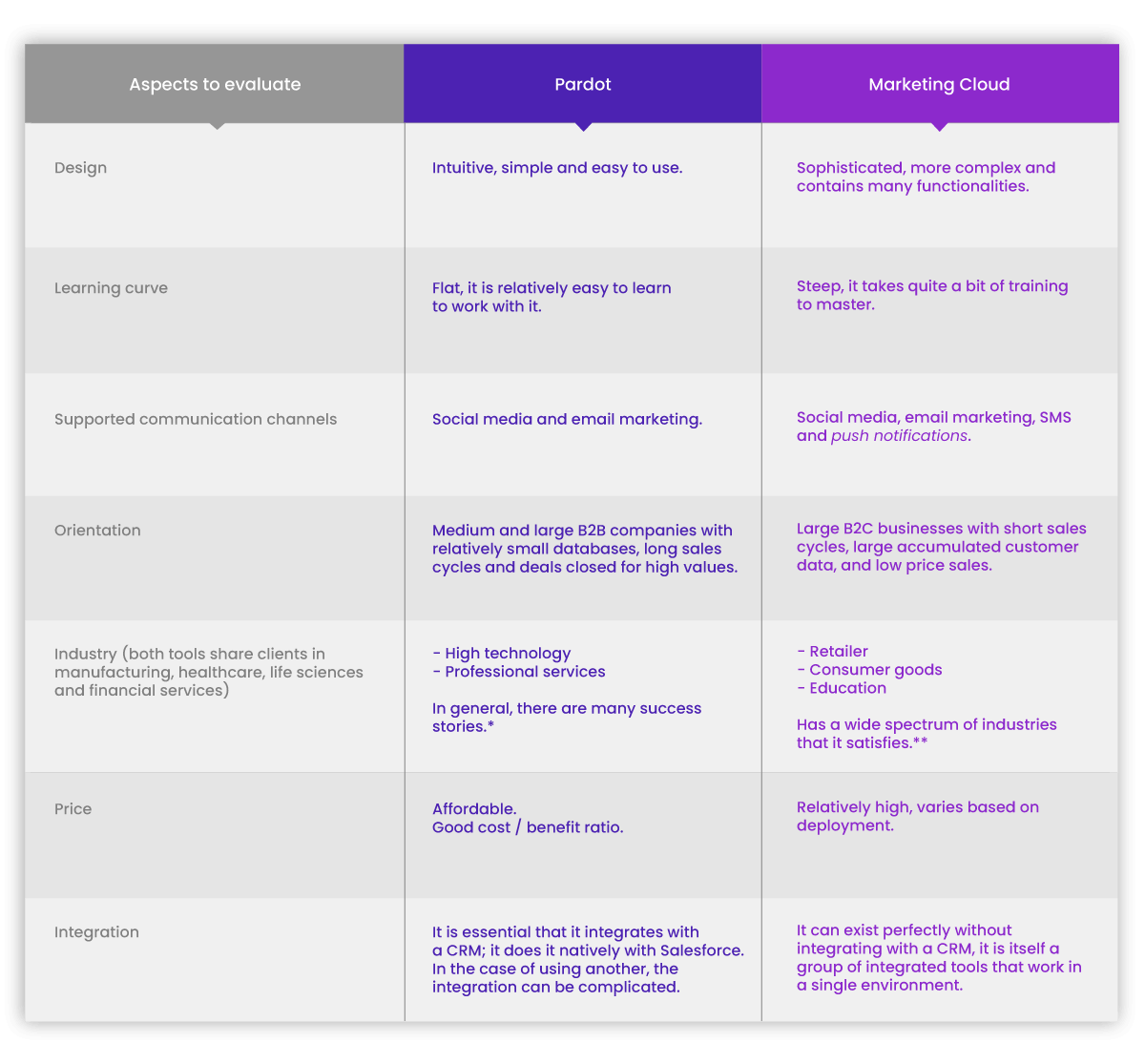
Pardot vs Marketing Cloud - How to Choose Wisely?
If you got here, it is because you have made the right decision; you have taken a step forward and decided to invest in marketing automation. The fascinating world of Salesforce presents before you two powerful and efficient products: Pardot and Marketing Cloud that, well implemented, will guide your marketing efforts to success.
Before reviewing some characteristics, advantages and disadvantages, as well as similarities and differences between these two products, it is important to identify particularities of your business that guide you during your decision-making. You can lean on the following questions:
- Is your company B2B or B2C?
- How big is your business and how much information do you keep about your customers?
- How are your sales cycles?
- Do you usually close your deals in stores, on websites or through sales teams?
- What communication channels would you like to cover with your marketing strategy?
- Do you have a CRM?
Now, with these questions in mind, everything will be easier. Even with the versatility and customization capacity of Pardot and Marketing Cloud, let us not forget that each one has been designed for a particular purpose.
![]() Don't forget to check out: Getting Started With Salesforce Pardot | The Basics
Don't forget to check out: Getting Started With Salesforce Pardot | The Basics
Main Characteristics of Pardot and Marketing Cloud
Pardot
-
- Positioned as a B2B marketing automation tool.
- Pardot has a very intuitive and easy-to-use email marketing editor. It allows you to design your own templates in record time, upload a template you already have or choose between pre-defined templates.
- Pardot stands out for its detailed Return on Investment (ROI) reports, which allows a more in-depth analysis of the impact of marketing on revenue.
Do
- Generation of high-level leads, allowing the creation of landing pages and forms quickly and with excellent designs. In addition, it has Pardot Einstein, its Artificial Intelligence solution that significantly increases effectiveness when reaching potential customers.
- Very simple and functional lead management, with the automated configuration of scoring, grading, tracking and nurturing processes. It even allows the configuration of notifications when potential customers are active on your site.
Marketing Cloud
- A whole family of high-tech products aimed at generating great impact on B2C businesses. Mobile Studio, Email Studio, Web Studio, Social Studio, Advertising Studio, Journey Builder, and Content Builder.
- Highly configurable; modules can be deployed according to your marketing needs.
- Marketing Cloud is a platform that allows you to offer your customers a highly personalized or one-to-one experience, through multiple channels: mobile, mail, web, etc. Also, if you wish, you can reach countless clients with a single shipment.
- It is capable of collecting data from multiple sources: CRM, points of sale and each point of contact with the client in general.
- Marketing Cloud works as a data warehouse that integrates all customer information.
Main Differences Between Pardot and Marketing Cloud
* https://www.pardot.com/customers/?fwp_industry=utilities
** https://www.salesforce.com/products/marketing-cloud/customer-stories/
![]() Check out another amazing blog by SkyPlanner here: Salesforce Editions - Keys for a Successful Selection
Check out another amazing blog by SkyPlanner here: Salesforce Editions - Keys for a Successful Selection
In summary, if you have a B2B business model and need to coach your customers through long sales cycles, Pardot might be a good fit. If your stores or warehouses are territorially distributed with highly demanded products and your weekly sales reports show high volumes, Marketing Cloud is quite close to what you need. If you also have the projection of increasing your range of products and customers, you could benefit a lot from the Marketing Cloud suite.
To choose wisely, it is necessary to value many aspects and remember that nothing is set in stone. Pardot may perfectly satisfy the demands of a B2C business or a business with long sales cycles may find success with Marketing Cloud. However, there is a possible scenario in which the joint use of both solutions is advantageous. Although it is true that many of the functionalities would overlap, it is also true that they can be complemented.
We hope you have understood everything much clearer; however, if the choice is still difficult for you, our Salesforce consultants can help you. Contact us by sending an email to [email protected].





Responses